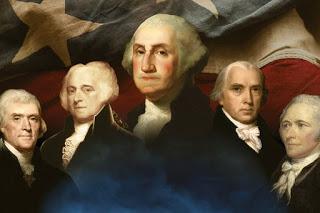 On this Independence Day, let us model ourselves on the best of the Founding Fathers. Let us remember that we have values so that we can evaluate where we are and strive to do better. Let us have the ability to recognize failure, but see it as an opportunity to create something better.
On this Independence Day, let us model ourselves on the best of the Founding Fathers. Let us remember that we have values so that we can evaluate where we are and strive to do better. Let us have the ability to recognize failure, but see it as an opportunity to create something better.Jefferson, a devotee of the Enlightenment, knew slavery was wrong when he wrote the words that "all men are created equal." It was a phrase that he could never live up to, but it has been the rallying cry throughout our history as our oppressed minorities have fought for recognition of their rights -- and won.
The initial United States, a confederation of independent countries, failed miserably because of too strong an emphasis on the individual, because of too great a fear of centralized government. In response, the Framers of the Constitution launched the second, quieter American revolution where they pushed back against the forces of dissolution and created a republican government that has survived for over 230 years. It proclaimed that government has a role beyond protecting individual rights. Legitimate governance will "establish justice, insure domestic tranquility, provide for the common defense, promote the general welfare, and pursue the blessings of liberty."
Perhaps most wisely, they called this second government a "more perfect union", recognizing the impossibility a creating one that could not be improved, but acknowledging our responsibility as "the People of the United States" to pursue that path nonetheless. Madison immediately wrote amendments to the Constitution to ensure that the people, and state governments, did not have to fear an imperial government. But those amendments, binding only on Congress, left people's rights dependent on their state governments.
The Civil War and the Reconstruction Amendments that followed, transformed the Constitution from a document that protected individuals and states from a too powerful central government to one that recognized that civil rights are often most at risk from those governments closest to us -- state and local. The Bill of Rights was extended to apply to these governments as well and, eventually, led to the Civil Rights Act of 1964 and the extension of civil rights to women and the LGBTQ+ community.
We are at another crucial point of another revolution. Once again we have the opportunity to push back against the forces of hate, of fear, of cynicism and ignorance, of our failure to apply the rule of law equally. This Fourth of July is a moment filled with hope that must be backed by determined activism. Those who came before us fought and won partial victories. On this Independence Day, may we work to give still greater voice to the better angels of all our natures and strive for a still more perfect union.
__________________________________Miriam Kerzner is a member of the CBC faculty. She's an instructor in Political Science.

